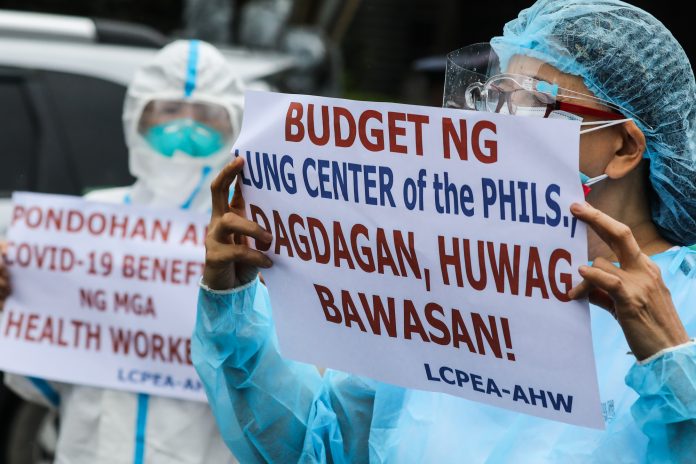Filipino health workers have expressed their concern regarding the massive budget cuts in the health sector, saying this will further make it inaccessible to the country’s poor.
In September, the Alliance of Health Workers (AHW) held a protest in front of the Philippine Senate to demand a higher budget for the health sector, including a pay hike for health workers and the provision of their allowances.
As it stands, the health department is slated to suffer a budget cut amounting to P10 billion ($176 million). This, the AHW said, will have an impact on the 69 public hospitals that they run.
Specifically, specialty hospitals such as the Lung Center of the Philippines (LCP) will suffer a P1.7 billion ($29.9 million) cut, while the Philippine General Hospital’s budget will be reduced by P2 billion ($35.2 million).
Cristy Donguines, president of Jose Reyes Memorial Medical Center Employees Union-AHW, said that these budget cuts “will greatly affect the public health care system in the country”.
“Where will the poor patients go now, knowing that they will be shouldering most if not the full cost of hospitalization,” AHW said.
Maria Ellinor Bernardino, 45, a call center agent who takes care of her mother Amor Bernardino, 69, who had a mild stroke, expressed her concern with the health budget cut, saying that it upsets her considering that there are many Filipinos who cannot afford to be hospitalized or treated due to poverty.
Bernardino’s mother has been in and out of the hospital for the past seven years and makes visits at least two to three times a month.
Out-of-pocket expenses
Bernardino said that since her mother is now a senior citizen, her hospitalization in a public hospital is now covered by the privilege of free services in all service wards within government healthcare facilities.
However, Bernardino expressed her dismay because most of her mother’s maintenance medicines were not available in the hospital pharmacy. She then needs to buy them outside, which are much more expensive.
“We still shoulder expenses. If only the medicines at the hospital’s pharmacy were complete, the expenses would have been covered by the government’s program. It’s just that the service in the public hospital is poor,” she added.
On some days, Bernardino said they cannot buy her mother’s medicines in bulk so they just buy on a day-to-day basis to ensure that her medications are met.
The AHW called the government “deaf” because of the continuous cuts in the healthcare fund despite the rising percentage of people suffering from infectious diseases such as tuberculosis, pneumonia, dengue fever, measles, diphtheria, sore eyes, and other poverty-related conditions such as gastroenteritis, diarrhea, malaria, and AIDS/HIV.
The government reduced the budget for the Prevention and Control of Communicable Diseases amounting to P1.3 billion ($22.8 million), while P8 million ($140K) was slashed from the Philippine National Aids Council.
On the other hand, the National Reference Laboratory (NRL) was cut by P32.96 million ($580) with the Research Institute for Tropical Medicine (RITM) suffering the biggest cut among all the NRLs amounting to P23.36 million ($411K).
Romeo Garcia, president of RITM Employees Association-AHW said that this may be the government’s way to begin the abolition of RITM.
The AHW is also appealing a P33,000 entry salary for a grade 1 health worker and funds for the health workers’ salary in the 2024 budget because of the increasing inflation rate and intensifying economic crisis.
“We call on the senators and the public to support our call in upholding people’s right to health, fight for higher health budget, and oppose the continuing neglect of people’s health and health workers’ welfare by the Marcos Jr. administration,” AHW stated.
Fight for just compensation
Meanwhile, more than three years since COVID-19 reached the country’s shores, Filipino health workers are still fighting for the just and timely release of their allowances and other benefits.
Of late, Filipino health workers celebrated their victory when the Commission on Elections approved the request of the health department to allow them to continue receiving their Health Emergency Allowance (HEA) and COVID-19 Compensation.
This is per the Omnibus Election Code, which states that the promotion or dissemination of increases in salary remuneration, or privileges in the villages is prohibited in a span of ten days as part of the general guidelines and regulations for the Barangay and Sangguniang Kabataan Elections (BSKEs).
On Sept. 26, the health department released an order stating that those who are eligible to claim their allowances and COVID-19 benefits shall proceed even in the election ban period.
This applies to private and public workers.
“Nothing is impossible with collective action,” said the Alliance of Health Workers in a statement.
“The continuous cut on health budget shows that health is the least priority of Marcos Jr. government, which is the opposite of its call for ‘health care for all’,” Donguines said.
This article was first published by Bulatlat.com









